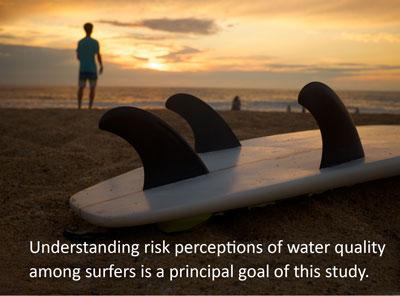Impaired water quality and the subsequent beach advisories and closures are significant problems facing the Gulf of Maine. Surfers are a sub population of beach goers who are at a greater risk of suffering from the effects of microbial pathogens. We have investigated risk perception of water quality in the surfing population of southern Maine and New Hampshire. Given the level of pathogen exposure and the corresponding health risk, coupled with a strong sense of environmental sustainability within the local surfing community, this population may provide valuable insight into water quality issues.

Surfers represent an at-risk population for the consequences of impaired water quality in Maine and New Hampshire. They enter the water year round for prolonged periods of time, including during high pathogen risk events, and are prone to internal water exposure due to wounds or ingestion.
We have explored these research questions with this population:
RQ 1. To what extent are surfers in Maine and New Hampshire aware of the potential risk of pathogens and diminished water quality? Where does the knowledge of pathogens come from (what are the sources of this knowledge)?
RQ 2. What are the attitudes and behaviors of this group towards perceived risk of harmful pathogens? How does knowledge of pathogens drive the decision to surf or not to surf during storm events?
RQ 3. Could heightened awareness of pathogens and water quality increase the individual drive to spread knowledge to other community members, groups, or stakeholders?